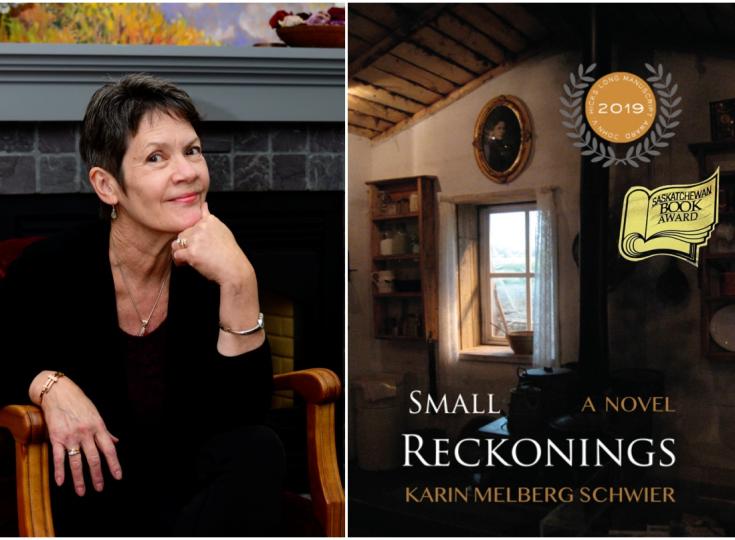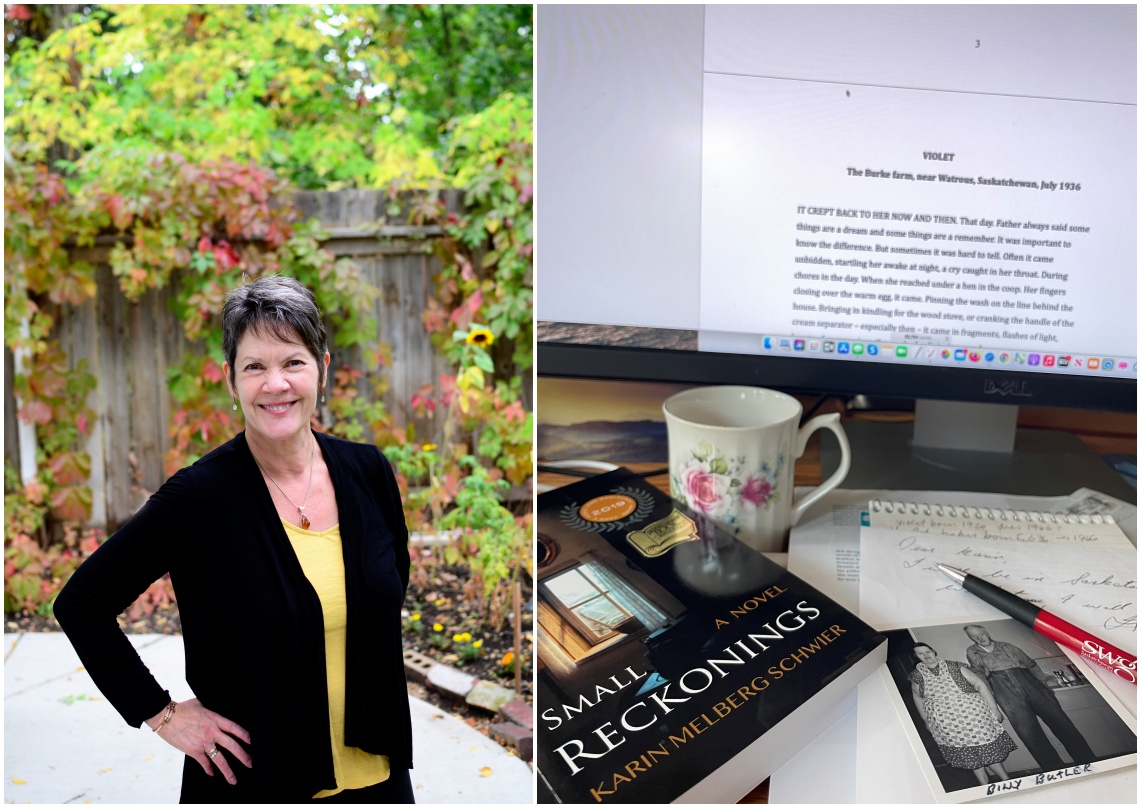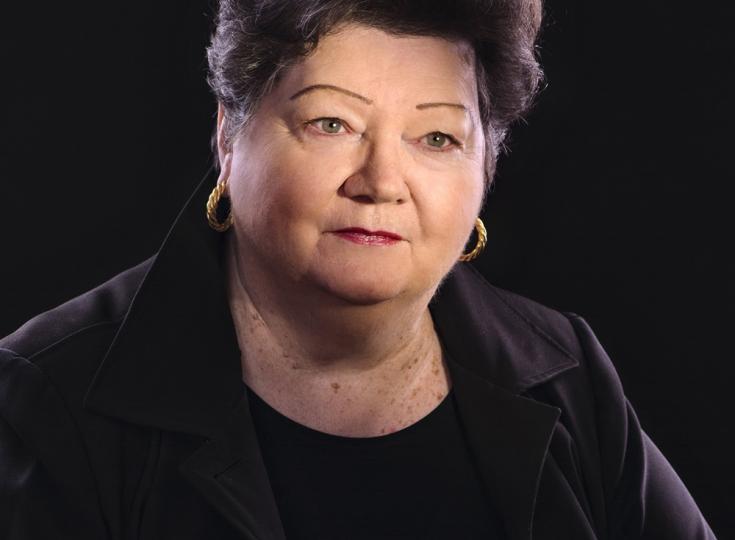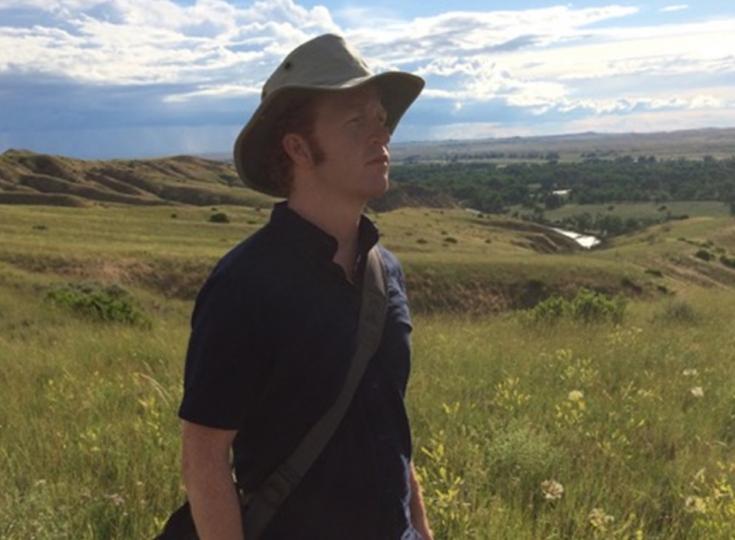Karin Melberg Schwier - A Graceful, Poignant Debut Novel

Karin Melberg Schwier writes for and is the editor of Saskatoon HOME magazine; she is also a writer for Prairies North. She has written and co-authored six non-fiction and two illustrated children's books exploring the lives of people with disabilities. In 2013, Karin received a YWCA Women of Distinction Award (Arts, Culture and Heritage). In addition to the awards she received for her debut novel, Small Reckonings, she was thrilled to receive the John V. Hicks Award for Fiction in 2022, this time for the sequel, Inheriting Violet. Karin lives in Saskatoon. As our Author of the Day, she tells us about her book, Small Reckonings.
Please give us a short introduction to what Small Reckonings is about.
Based on a true story, Small Reckonings delves into the physical and emotional isolation of the Burke family in the 1920s and 1930s when homesteaders scratched out a new existence on the western Canadian prairie. William, an adventurer from New Zealand, brings his city bride Louise to the freshly broken earth of his farm near Watrous, Saskatchewan. Their story unfolds against the sweep of Saskatchewan prairie, and with the birth of a son, the couple believes their future is optimistic. Then Violet, the child born ‘feebleminded,’ plunges her mother—a woman burdened with a secret—back to a time of guilt and regret. The child draws out goodness, and weakness, in farmers Nik and Hanusia Yuzik, and loyalty in neighbours Hank and Emily. But tragedy and an unspeakable betrayal by William’s trusted friend upend the Burke family, taking all these characters at breakneck speed toward forgiveness and the realization that no one is infallible. I’m really happy that Shadowpaw Press has taken it on and re-released it to reach a wider readership.
What inspired you to write this story? Was there anything in particular that made you want to tackle this?
The seed of this story actually walked into my office when I worked for an advocacy organization for people with intellectual disabilities. A retired farmer named Hank Buck was the executor of his friend’s will. Bill, a neighbour farmer, had entrusted Hank to look after his daughter Violet who had Down syndrome after his death. Hank did that, and when she died, the estate was to be donated to our organization. Hank sat in my office and asked if I’d like to hear the story. Of course I would! Another area farmer, also a friend of Bill’s, had been charged with sexually assaulting Violet when she was a teenager. A baby was born and taken. The farmer was given the lash and sent to prison under a law that made it a crime to ‘have carnal knowledge of a girl or woman known to be feeble-minded.” It was a real law at the time. When he got out, his humiliated wife banished him from the house. He set up camp in the barn, caught pneumonia that winter and died. As Hank was telling me all this, I remember thinking this such a fantastic story and would make a powerful novel. I stayed in touch with Hank and this idea just wouldn’t go away. I eventually asked him if I could write a new story based on a couple of the original details. No family was left now, he said, and gave me his blessing. I made Hank a major character in the story, basically casting him as Bill’s friend, as he was in real life.
Why did you title this book Small Reckonings?
As my story unfolded, the characters faced the outcomes, the consequences of so many decisions, large and small, that ended up having such an impact on their lives and the lives of others. Each had to deal with those reckonings — or not deal with them — and I found it interesting to see where their decisions took them. Something as benign as giving a son a horse for his 13th birthday or as life altering as failing to protect a child from an abuser, things that shaped the characters, the way they saw themselves and others, and took their lives in unexpected trajectories. It made me think of all the little things that affect our lives; how often has each of us said, “You know, if that hadn’t happened, I wouldn’t be here now…"
How much research did this book require from you to make the history part of it ring true?
Lots! Early on when I had just a very rough idea of the story, I took a creative writing class at the University of Saskatchewan taught by Guy Vanderhaeghe. I was obsessed with the details and spent so much time with a local history book of the area in which I set the story, so much time spent on what the Depression was like, farming details, small town details, how people with disabilities were treated at that time. Finally I got a good shove from Guy who said, “You realize it’s fiction, right? You have to get on with it and tell the story.” So I got down to it. But details are important to make it believable. The trick is to use details wisely and not beat readers over the head with them. I did have the advantage of having grown up on a farm near Seattle until I was 10, then time spent living in a very remote and isolated village in northern B.C. from 1969 to the early 70s. Another farm, a small dairy farm my parents had after that in the Peace River country of northern Alberta. When I was writing about characters finding their way to the outhouse in mid-winter, chopping holes in the ice for livestock, cutting firewood, and getting eggs from the chicken coop, I knew what that was like. Starting in high school, I worked for a weekly newspaper and interviewed pioneers in the area, always fascinated by the stories of homesteaders, the details of their daily struggles. I was always struck by the common theme; life was hard, but you just put your head down, did your work, looked after your family and the animals, and found joy in life where you could. They were very popular pieces in the paper, so were published as a book in 1978. That book, my own farm experience, and the local history book I found served as a great stockpile of details for the novel. Also my in-laws who came from farm stock in Indiana, and my mother, who grew up on a farm in Minnesota. I tortured everyone for a long, long time, asking for childhood memories.
Why did you pick the Canadian prairie as the backdrop of your story?
Because the original true story really did happen here. And while I didn’t place the story in exactly the same community, I chose Watrous, Saskatchewan, largely because of that local history book I came across in the library. And I’ve always enjoyed historical fiction in rural farming settings.
Tell us more about William. What makes him tick?
William is lovely. A kind, compassionate man who cares deeply for his family and wants to make a good life for them. Making his wife content was always his goal; he just didn’t realize he was up against something that would never let that happen. And that was Louise herself. She simply couldn’t get past her past. To William, Violet was always “a box of fluffy ducks,” a term of endearment I first heard when I lived with a farm family in New Zealand in 1979-80. To William, Violet being “feeble-minded,” which was the way someone with an intellectual disability was described at that time, was simply part of his little girl and she was fine just the way she was. The fact that his family ultimately fell apart was devastating to him, but he still had her and the two of them would carry on together. There was a lot more New Zealand backstory to William that was eventually cut, but writing it did help me know him better. He’s a bit of a composite of several people I know here and in NZ.
What was the most challenging aspect of writing this story?
Probably believing I could do it. I had written and published several non-fiction books so the process of getting the work done was not unfamiliar. But this was my first big step into fiction. It took a ridiculously long time to first get it into something I was willing to show to publishers. Then search for a publisher, writers will now, took a painfully long time to submit, wait and eventually hear back. I have an impressive stack of rejections—so that was difficult. I was working full-time, too, for that advocacy organization so there would be long spells where I didn’t touch the project. But I would sometimes dream about the characters and what they were doing, so it really wouldn’t leave me alone. I guess another challenge was to write the scene about the assault from Violet’s point of view; that was pretty unnerving and there were a lot of rewrites.
Interesting cover. Please tell us more about how it came to be.
My photograph was always the one I had envisioned as the cover. It was taken at the Western Development Museum exhibit called Winning the Prairie Gamble. A wonderful exhibit about homesteading in Saskatchewan and how farmers coped and survived. The picture is taken inside a little sod cabin, a soddy, and I remember walking in to have a look years ago and thought, “This is William and Louise’s house!” The WDM gave me permission to use the photo should the novel ever come to be. But my first publisher, Burton House Books in Regina, wanted a different image. So the cover of the first edition, and the first two printings, was of a painting by Margaret Vanderhaeghe, a nice full-circle moment since Guy had such a great influence on the very early versions of the manuscript years before. I was able to finally use my photograph for the cover and I’m really happy that the re-release by Shadowpaw Press features that image. To me, that takes the reader right inside the Burke home.
Small Reckonings is an award-winning novel. What surprised you most about readers' reaction to this book?
It was first published in 2020, right as the pandemic got underway so I ended up doing many author readings by zoom to book clubs. It was always fun to sit back and listen to people discuss and even argue about the motivations of the characters. This is why Louise would do this. This is what William meant by that. Hank did this because… It was gratifying to see that readers had invested in the characters (even though sometimes those motivations they discussed were nothing like I had intended when I wrote them!) It’s also been great to see how all those farm details, the setting and time period have resonated with readers who grew up during this period, or at least had grandparents or parents who had farm backgrounds. So many readers have sent me letters and emails describing the memories they have been reminded of by reading the story. And a surprising number have told me they remember someone with a disability during that era and what their life was like.
What do you hope readers take away from this story?
I just hope they feel like it was a good story, a satisfying read. I was always afraid of writing a story that would be thin and wouldn’t hold a reader's attention. I hope readers finish the book and for a while those characters will stay in their thoughts. I hope they wonder what happened next. The characters still ride around in my head, that’s for sure!
When starting on a new book, what is the first thing you do?
I probably think, “How am I ever going to do this?” I am the editor of Saskatoon HOME magazine and I write pieces for Prairies North magazine, too. Because I’m writing batches of articles (some assigned and some I pitch), I’m always in a state of slight panic, the “I don’t know if I can get it all done. This time I’ve taken on too much!” followed by “Oh, I got that done. Now I need to dig up something else to write.” Although I had written a number of non-fiction books and a couple of illustrated children’s books, my first novel just felt like a monumental task. I’m always in awe of writers who can produce a great work every couple of years or so.
Do you have any interesting writing habits? What is an average writing day like for you?
I don’t know, really, other than I absolutely can’t have noise when I’m writing. My husband had an academic career and when he was writing, he could have the IU basketball game on, he could have music playing, our son can have the TV on in the same room. But I’ve got to have quiet. If I can manage it, I like to get up early and write before anyone else is awake. Jim, our adult son, lives with us. He has a disability so I do feel a lot of guilt about sinking into a writing project unless my husband Rick has Jim occupied. I guess I don’t have an average writing day, but when I’m doing my magazine writing and editing, there are spells with a flurry of work where I have to meet multiple deadlines. My husband and I work well together and coordinate our time so Jim gets what he needs and we can attend to our creative projects and regular life, too.

What are you working on right now?
Well, here’s the thing. In the spring of 2021, the real Hank came to visit. We did a distanced visit on the porch. I asked him to retell the original story so I could record it. Hank loves to tell stories so he launched into it and about ten minutes in, he dropped this piece of information and I shrieked “You never told me THAT before!” “Oh, sure, that’s what we thought happened.” Well, had he given me that detail the first time, the novel would have never been written the way it was. But I almost heard the clunk as a big piece of the story fell into place. In fact, I was already working on the sequel to Small Reckonings by this time. My publisher/editor with Burton House Books (Byrna Barclay, who just passed away this month) had pulled the end chunk off my original manuscript and said, “This is your second novel.” So that 50 pages or so has been waiting. But I wasn’t really sure what to do with it. It need something significant and boy, did Hank hand me that on a platter! As soon as Hank left, I told my husband about it and Rick said, “My god. That’s your sequel!” So Hank’s bombshell turns the story on its head and my sequel just started falling into place. This was year two of the pandemic so we were staying close to home. Rick and I worked out a deal where I could go disappear into our guest room for two or three days at a time. He took over everything else and I just disappeared. He even delivered meals to the door! And the occasional glass of wine at the end of a good writing day. I started on the sequel in March and by September, I had a good workable draft. Rick read the whole thing and we were both pretty pleased with it. It holds together. In fact, last fall, the manuscript won the 2022 John V. Hicks Award for Fiction, the same award I won with the debut novel in manuscript form in 2019. I’m still fiddling with the manuscript to get it in shape for submission so keep your fingers crossed! Funny, but now and then I get an email from a reader who wants to know what happens next. So I’m excited that, with any luck, they’ll be able to find out!
Where can our readers discover more of your work or interact with you?
My website is www.karinschwier.ca My blog is there, my list of books. And they can go to Shadowpaw Press shadowpawpress.com and search on the Authors link.





